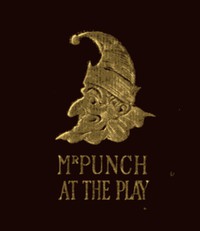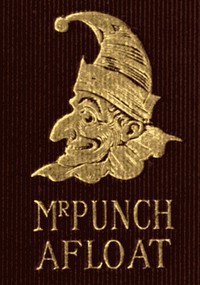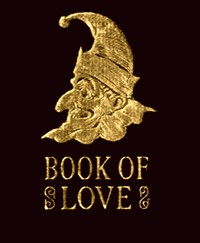Mr. Punch Awheel: The Humours of Motoring and Cycling by J. A. Hammerton (android e book reader TXT) 📗

- Author: J. A. Hammerton
Book online «Mr. Punch Awheel: The Humours of Motoring and Cycling by J. A. Hammerton (android e book reader TXT) 📗». Author J. A. Hammerton
He. "Do you belong to the Psychical Society?"
She. "No; but I sometimes go out on my brother's machine!"
Brake, brake, brake
On my brand-new tyre, Marie!
And I would that my tongue could utter
The thoughts that arise in me.
O well for the fishmonger's boy
That his tricycle's mean and squalid;
O well for the butcher lad
That the tyres of his wheel are solid!
And the reckless scorchers scorch
With hanging purple heads,
But O for the tube that is busted up
And the tyre that is cut to shreds.
Brake, brake, brake—
Thou hast broken indeed, Marie,
And the rounded form of my new Dunlop
Will never come back to me.
A Suggestion in Nomenclature.—The old name of "Turnpike Roads" has, long ago, with the almost universal disappearance of the ancient turnpikes, become obsolete. Nowadays, bicycles being "always with us," why not for "Turnpike Roads" substitute "Turn-bike roads"? This ought to suit the "B. B. P.," or "Bicycling British Public."
[Pg 23]"Oh, did you see a gentleman on a bicycle as you came up?"
"No; but I saw a man sitting at the bottom of the hill mending an old umbrella!"
[Pg 24] THAT BICYCLE LAMP
The other Sunday afternoon I rode over on my bicycle to see the Robinsons. They live seven miles away. Tomkins and others were there. People who live in remote country places always seem pleased to see a fellow creature, but Robinson and his wife are unusually hospitable and good-natured. After I had had some tea, and thought of leaving, a hobnail was discovered in the tyre of Tomkin's bicycle. He, being very athletic, was playing croquet, a game which requires vast muscular strength. However, he said that his tyres were something quite new, and that in one minute one man, or even one child, could stick one postage-stamp, or anything of the sort, over that puncture and mend it. So all the rest of us and the butler, principally the butler, who is an expert in bicycles, went at it vigorously, and after we had all worked for nearly an hour the tyre was patched up, and Tomkins, having finished his game, rode coolly away. I was going to do the same, but Robinson wouldn't hear of it—I must[Pg 26] stay to dinner. I said I had no lamp for riding home in the dark. He would lend me his. I said I should have to dine in knickerbockers. That didn't matter in the country. So I stayed till 9.30.
The next Sunday I rode over again. I started directly after lunch, lest I should seem to have come to dinner, and I gave the butler that lamp directly I arrived. But it was all no good, for I stayed till 10, and had to borrow it again. "Bring it back to-morrow morning," said Robinson, "and help us with our hay-making." Again dined in knickerbockers.
On Monday I resolved to be firm. I would leave by daylight. Rode over early. After some indifferent hay-making and some excellent lunch, I tried to start. No good. Robinson carried me off to a neighbour's tennis-party. After we returned from that, he said I must have some dinner. Couldn't ride home all those seven miles starving. Knickerbockers didn't matter. Again dined there and rode home at 10.30.
So I still have Robinson's lamp. Now I want to know how I am going to get it back to his house.
If I have it taken by anybody else he will think I don't care to come, which would be quite a mistake. Have vowed that I will not dine there again except in proper clothes. If I cross his hospitable threshold, even before breakfast, I shall never get away before bedtime. Can't ride seven miles in evening dress before breakfast even in the country. Besides, whatever clothes I wore, I should never be able to leave by daylight. I should still have his lamp. Can't take a second lamp. Would look like inviting myself to dinner. So would the evening clothes at breakfast. What is to be done?
[Pg 25]The Retort Curteous.—Motorist (cheerfully—to fellow-guest in house party). "What luck? Killed anything?"
Angler (bitterly). "No. Have you?"
[Pg 27]Vicar's Daughter. "Oh, Withers, your mistress tells me you are saving up to take a little shop and look after your mother. I think it is such a sweet idea!"
Withers. "Well, yes, miss, I did think of it; but now I've got the money I've changed my mind, and I'm going to buy myself one of these 'ere bicycles instead!"
[Pg 28]The Inference.—Giles (who has been rendering "first aid" to wrecked motor-cyclist). "Naw, marm, I doan't think as 'e be a married man, 'cos 'e says this be the worst thing wot 'as ever 'appened to un!"
[Pg 30]Effie (to whom a motor-brougham is quite a novelty). "Oh, mummy dear, look! There's a footman and a big coachman on the box, and there isn't a horse or even a pony! What are they there for?"
Mummy dear (not well versed in electricity and motor-mechanism). "Well, you see, Effie dear—the—(by a happy inspiration) but, dear, you're not old enough to understand."
The Daily Mail has discovered that the "Motor-Cough" is "caused by the minute particles of dust raised by motor-cars which lodge themselves in the laryngeal passage." If people will use their gullets as garages, what can they expect?
[Pg 31]Horsey Wag (to Mr. and Mrs. Tourey, who are walking up a hill). "And do you always take your cycles with you when you go for a walk?"
[Pg 32]In East Dorsetshire.—Cyclist (to Native). How many miles am I from Wimborne?
Native. I dunno.
Cyclist. Am I near Blandford?
Native. I dunno.
Cyclist (angrily). Then what do you know?
Native. I dunno.
[Cyclist speeds to No Man's Land in the New Forest.
OUR BARTERERSBicycle.—Thoroughly heavy, lumbering, out-of-date machine, recently doctored up to look like new, for sale. Cost, second-hand, six years ago, £4. Will take £12 for it. Bargain. Would suit a dyspeptic giant, or a professional strong man in want of violent exercise.
Safety Cycle.—Pneumatic tyres. A real beauty. Makers well known in Bankruptcy Court. Owner giving up riding in consequence of the frame being thoroughly unsafe, and the tyres constantly bursting. Would exchange for one of Broadwood's grand pianos or a freehold house in the country.
[Pg 33]The ? of the Day.—Should there be a speed (and dust) limit?
[Pg 34]The Queen's Highway.—Infuriated Cyclist (after a collision with a fast-trotting dog-cart). I shall summon you to-morrow! I've as much right on the road as you, Jehu!
Irate Driver. And I shall summon you! This thoroughfare's mine as well as yours, let me tell you, Scorcher!
Pedestrian (who has been nearly killed by the collision, and is lying prostrate after being cannoned on to the path, very feebly). And what about me, gentlemen? Have I any right of way?
The constant strain of driving motor-cars is said to be responsible for a form of nervous break-down which shows a decided tendency to increase. One certainly comes across a number of cars afflicted in this way.
"PIKES AND BIKES"
(By a "riding Poet")
In years gone by our sires would try
To abrogate the highway "pikes."
No tolls to-day, can bar the way,
But freeing of the road brought "bikes";
And there are many Northern Tykes,
Who would prefer the "pikes" to "bikes."
[Pg 35]Old Lady (describing a cycling accident). "'E 'elped me hup, an' brushed the dust orf on me, an' put five shillin' in my 'and, an' so I says, 'Well, sir, I'm sure you're hactin' like a gentleman,' I says, 'though I don't suppose you are one,' I says."
[Pg 36]A motor-car, proceeding along the High Street the other evening, took fright, it is supposed, at a constable on point-to-point duty, and exploded, blowing the occupants in various directions over the adjoining buildings. The policeman is to be congratulated upon averting what might have been a serious accident.
A well-known motorist has been complaining of the campaign waged against motor-cars by humorous artists, who never seem to tire of depicting accidents. "One common and ludicrous error in many drawings," he said, "is the placing of the driver on the wrong side of the car." But surely, in an accident, that is just where he would find himself.
Sympathetic Lady. "I hope you had a good holiday, Miss Smith."
Overworked Dressmaker. "Oh yes, my lady. I took my machine with me, you know!"
S. L. "What a pity; you should give up needle and thread when you're out for a——"
O. D. "Oh, I don't mean my sewing machine! I refer to my bicycle!"
[Pg 37]Driver of Motor-car (who has just pulled up in response to urgent summons from countrywoman). "Well, what's the matter? What is it?"
Countrywoman. "Hi, man, look! You've been an' left yer 'oss on the 'ill!"
[Pg 38] THE CYCLING GOVERNESSI no longer teach my classes
Their Shakespeare and the glasses,
And the uses of the globes, as was my custom;
But all they'll learn from me
Is to ride the iron gee—
All other lessons utterly disgust 'em!
The girls no more will meddle
With the painful piano-pedal,
They'll only touch the pedal of their "Humber";
Like their grannies, they begin
At an early age to "spin,"
But the road it is their spinning-wheels encumber.
So wheeling now my trade is,
And finishing young ladies
In the proper kind of bicycling deportment;
I'm nearly finished, too,
And battered black and blue,
For of falls I've had a pretty large assortment!
WOE ON THE WHEEL.There was a "scorching" girl, who came down an awful purl,
And scarified her nose, and scarred her forehead.
She thought, when first she rode, biking very, very good,
But now she considers it horrid!
[Pg 39]Winny (one mile an hour) to Annie (two miles an hour). "Scorcher!"
[Pg 40]The Favourite of the Motor-Cars.—Petroleum.
In England, says a French writer, motoring is not considered a sport because it does not involve killing anything. This is but one more example of Continental aspersion.
As a result of his trip over the Gordon-Bennett course, the Roman Catholic Archbishop of Dublin now recommends the motor-car for pastoral visits. This will be no new thing. For years past some people have looked on the motor-car in the light of a visitation.
Cycling Conundrum.—Q. What article of the cyclist girl's attire do a couple of careless barbers recall to mind?
A. A pair of nickers.
Motorists are still expressing their indignation at a recent disgraceful incident when one of their number, because he could not pay a fine at once, was taken to





Comments (0)